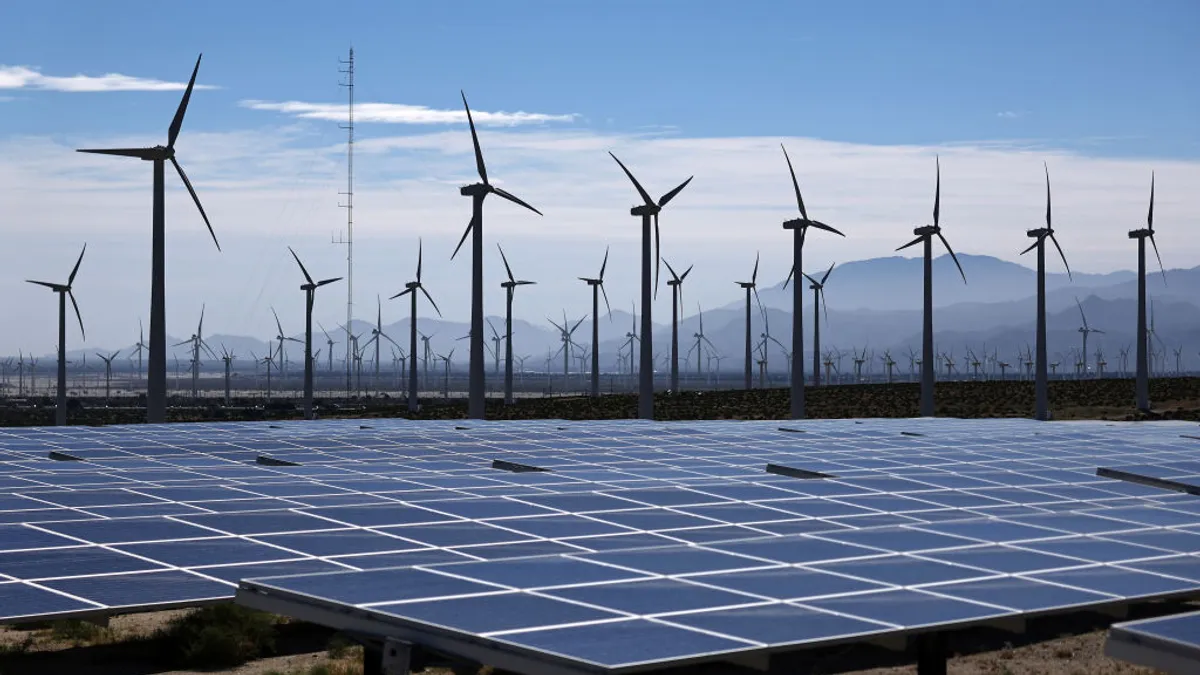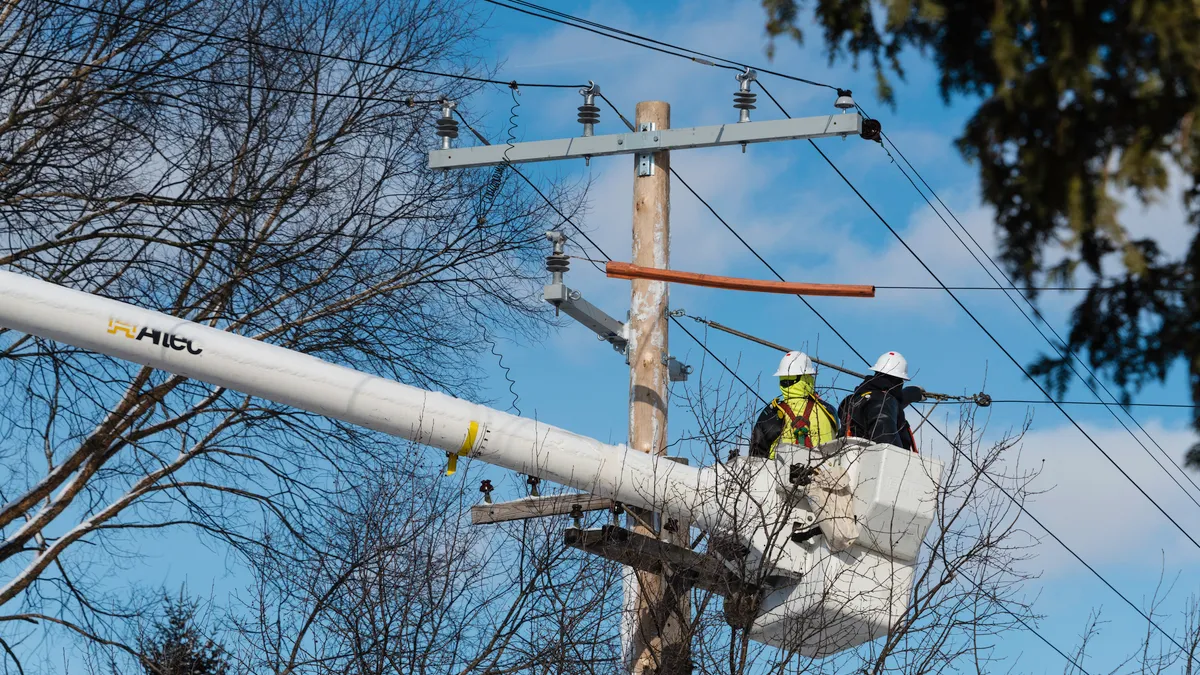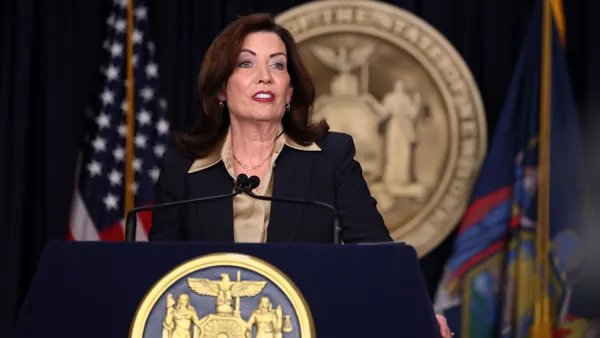Judge Brett Kavanaugh will bring enhanced skepticism toward environmental regulation to the Supreme Court and could threaten the foundations of independent federal agencies if he is confirmed by the Senate, energy lawyers tell Utility Dive.
On Monday, President Donald Trump announced he would appoint Kavanaugh, a judge on the D.C. Circuit Court of Appeals and a former George W. Bush administration staffer, to fill the seat on the High Court set to be vacated by Justice Anthony Kennedy, who will retire at the end of the month.
Kavanaugh, named by Bush to the federal appeals court in 2006, has a track record of questioning federal agency authority, including on regulations concerning energy and the environment.
"I think for all of these rulemakings his judicial philosophy and his temperament is to be skeptical of important, big, far-reaching agency rules, especially if they are interpreting or adapting older stuff in novel ways," said Jody Freeman, director of the Environmental and Energy Law Program at Harvard Law School. "It's all approached with this general skepticism toward overreach and ... He has no problem deciding not to defer [to federal agencies]. He has no difficulty."
"[Kavanaugh] tends to be very stingy and cramped in interpreting agency rulemaking authority," said Cara Horowitz, co-director of the UCLA Environmental Law Clinic. "He, for example, has said that although climate change is a real and urgent problem, he is very skeptical of [the Environmental Protection Agency's], current authority to do anything about that problem under the Clean Air Act."
That judicial approach would likely mean that federal agencies will have less latitude at the Supreme Court in crafting regulations, and will have to adhere more closely to the text of their underlying statutes. But some lawyers worry that Kavanaugh's skepticism toward federal regulation could go further, leading him to question the very foundation of agencies like the Federal Energy Regulatory Commission.
In 2016, Kavanaugh penned an opinion for the D.C. Circuit saying that independent federal agencies are a "threat to individual liberty" because the president can only remove their leaders for gross misconduct.
"He called into question the entire concept of the modern independent regulatory agency ... that is extreme judicial activism."

Joel Eisen
Professor of Law, University of Richmond
"In that opinion, he called into question the entire concept of the modern independent regulatory agency, and of course FERC is one such agency," said Joel Eisen, an energy law professor at the University of Richmond. "What he was attempting to do with one stroke of the pen was undo 80 years worth of jurisprudence and basically upset the entire apple cart of the modern regulatory agency. That is extreme judicial activism."
Whether or not Kavanaugh will apply that skepticism of independent agencies in the future, most observers expect him to win confirmation from the Republican-controlled Senate, where a simple majority would be enough to put him on the High Court.
“After looking at some more of his [decisions], I'm more impressed now than I was before,” said Tony Cavender, senior counsel at Pillsbury and the former chairman of the Environmental Law Committee at the Texas Oil and Gas Association. “So I think he's going to be a good justice and I don't think he'll have that much trouble getting confirmed. I think he's safe and eminently qualified."
Independent agency skepticism
Kavanaugh's 2016 opinion on independent agencies came as part of a case concerning the Consumer Financial Protection Bureau, a financial regulator set up by the Obama administration after Congress passed the Dodd-Frank reform bill of 2010.
Challengers argued that the CFPB was unconstitutional because it is led by a single director, rather than the multi-member boards that make up other independent agencies, like FERC or the Federal Communications Commission.
Kavanaugh backed that argument, but also went further, writing that independent agencies constitute "a headless fourth branch of the U.S. Government," and threaten the "constitutional system of checks and balances" because of "their massive power and the absence of Presidential supervision and direction." The D.C. Circuit later overturned that decision 7-3 in an en banc hearing, with Kavanaugh among the dissenters.
The extension of Kavanaugh's argument beyond the CFPB worries lawyers like Eisen, who are concerned it reveals an antipathy toward independent federal agencies generally.
"He didn't need to go that far to reach the particular result that a federal agency that has only one director like CFPB does was unconstitutional," Eisen said. "He didn't need to say every independent regulatory agency is on shaky ground, but he did, so I have to conclude that's what he believes and that he might be antagonistic to all of the independent agencies."
"Independent agencies like FERC may have some cause to fear how Kavanaugh will view them if the issue of their constitutionality ever comes in front of the court."

Cara Horowitz
Co-Director, UCLA Environmental Law Clinic
Kavanaugh's central issue with independent agencies is that their officials cannot be removed by the president at will, as the President can with cabinet posts like the EPA administrator or Secretary of Energy. That reveals the judge's belief in strong presidential powers, Horowitz said.
"In that CFPB case, he was clear that he's skeptical of too much authority with independent executive agencies — that is to say agencies that are outside the control of the president," said Horowitz. "He views the executive branch as unitary. He reads the Constitution as placing authority with the president within the executive branch, and I think it's fair to say that independent agencies like FERC may have some cause to fear how Kavanaugh will view them if the issue of their constitutionality ever comes in front of the court."
President Trump is also a believer in strong presidential powers, and Eisen says that fact could have played into how Kavanaugh wrote his decision.
"I think he was using this decision to audition for the Supreme Court because it put forward a radical and expansive view of presidential control of regulatory action," he said.
Other lawyers caution not to read too much into the CFPB ruling. Freeman noted that in the decision, Kavanaugh argued that it should be up to the Supreme Court to change the longstanding precedents around independent agencies — something he may be less likely to do if he actually sits on the High Court.
"It's one thing to sit as a D.C. Circuit judge writing the CFPB opinion. It's another thing to consider the weight of that longstanding precedent when you're on the Supreme Court," Freeman said, "so I just want to be careful about overreading that opinion."
Even if Kavanaugh does not directly question the foundations of FERC or other agencies, Eisen worries that the opinion reveals a penchant for judicial activism to enhance the powers of the presidency.
"It's exceedingly strident, far more so than it needed to be, and it got way ahead of the law in the area," he said. "It tried to make bold new statements about the law relating to agencies as a whole, and it was just wrong."
EPA policy threatened
Despite concerns with the structure of independent agencies, Eisen said Kavanaugh's decisions concerning specific FERC policies have been relatively mainstream.
"The biggest single trend in recent years for me is the series of orders that have refined and expanded the commission's jurisdiction in areas like demand response and storage and frequency regulation," Eisen said, "and on the basis of the writing that he's done, I wouldn't expect any of that move into new technologies to be threatened."
Power sector regulations from the EPA are likely on shakier ground, said Freeman. While the Federal Power Act's terms give FERC more latitude to set interstate electricity policy, the language of the Clean Air Act can be "quite precise" in what powers it grants EPA.
"There may be differences because of the statute and I think Kavanaugh would look very carefully at what the statutory authority is and then what the agency's reasoning is and what their record is," Freeman said. "I do think he takes them case by case, but it's all approached with this general skepticism toward overreach."
That skepticism would likely lead Kavanaugh to vote against many of the EPA's more ambitious regulatory programs dating back to the Obama administration, like the Clean Power Plan, which sought to limit carbon emissions from power plants until President Trump withdrew it for changes.
During a 2015 D.C. Circuit hearing on the regulation, Kavanaugh sharply questioned EPA lawyers over the rule's provision allowing power plants to comply by purchasing emissions credits from other generators. Such "generation shifting" is not permitted under the Clean Air Act, critics of the regulation argued.
"There's no way to leave that argument thinking he was going to vote to uphold that plan," Freeman said.
But even if he acts to curtail EPA's regulatory latitude, energy lawyers do not expect Kavanaugh to take aim at the foundations of its authority, such as the 2008 case Massachusetts vs. EPA that compels the agency to regulate greenhouse gases under the Clean Air Act.
"You could imagine Kavanaugh not voting the way Kennedy voted in Mass vs. EPA, but that is very different from saying that he would now want to undo a recent precedent."

Jody Freeman
Director, Environmental and Energy Law Program at Harvard Law School
Instead of a direct assault on that authority, Horowitz says Kavanaugh is more likely to use smaller findings around cost allocation or other technical rulemaking issues to roll back EPA's authority. He took that approach, she noted, in a 2015 opinion on the Mercury and Air Toxics Standards (MATS) that Justice Antonin Scalia drew heavily from when the Supreme Court ruled against the EPA regulations.
"In that case, EPA rulemaking was struck down, not because EPA didn't do cost benefit analysis but it didn't do it at the right point in the rulemaking process," Horowitz said, "so that's a good example of the judicial branch generally and Kavanaugh specifically interpreting agency authority narrowly."
Throughout his career, Justice Kennedy was the swing vote on a number of critical environmental cases, including Mass vs. EPA, decided in a 5-4 vote. That has caused much hand-wringing in environmental circles that the new court could act to unravel longstanding regulations, but industry lawyers say Kavanaugh and his conservative allies will likely not seek to upend established precedents.
"You could imagine Kavanaugh not voting the way Kennedy voted in Mass vs. EPA, but that is very different from saying that he would now want to undo a recent precedent," Freeman said. "You don't need to undo a recent precedent in order to keep a close watch on an agency and prevent it from overreaching. You can still impose constraints on the agency just like Kavanaugh would when it comes to the Clean Power Plan."
Even if some in industry and conservative politics want the Supreme Court to challenge EPA's authority to regulate carbon, Cavender said the extensive record of public health and environmental findings on climate change would make it difficult for even a sympathetic court to overturn.
"There's just been so much litigation in the district courts on the greenhouse gases, I don't think they're going to pull it back," he said. "If he’s a conservative, they look at precedent. Precedent now is perhaps a very narrow precedent, but it's still there and until something comes along and make them change their mind like a Brown vs. Board of Education, I think that's going to hold."



















